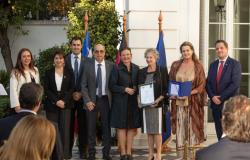Entering the House of the Americas is much more than crossing its thresholds. Along with her brilliant story, which reaches her 65th birthday this April 28, transcendent events, extraordinary personalities, and definitive foundations parade in the memory of those who know her.
Neither festive adjectives nor exaggerations. It is enough to get close to its domains to perceive it. No good Cuban should be unaware of what this House, erected in his Homeland, four months after the triumph of the Cuban Revolution, means to the spirituality of Latin America, and given to uniting, making visible and promoting the culture of the region, including of the native peoples.
The intellectual Abel Prieto Jiménez is the current president of the institution. There he is waiting for us to talk with Granma. Sixty-five years are said quickly, but the agenda defended, day by day, by an ambitiously human project, for which many writers and artists of the great Homeland feel so grateful, is tight.
“These days I have been reading a lot,” says Abel, to lead his arguments when asked about the first image that comes to mind when he thinks of Casa de las Américas. He has in his hands the book We Must Defend Life, Haydee Santamaría, a valuable compilation, with the seal of the Casa de las Américas Editorial Fund, by Jaime Gómez Triana and Ana Niria Albo Díaz.
«It has been truly very important to have this book for this date, because it is an opportunity for people to get closer to the founder of the House, beyond the great revolutionary she was, beyond the heroine of Moncada. There is a human Haydee, who lives with the heroes and martyrs that she loved very much, she admired and lost. It is a fundamental book to get closer to her, who is the one I think of first.
The evocation returns to the conversation all the time. Abel speaks of Haydee’s particular sensitivity to memory, of that “incredible instinct, that delicacy, when responding to each letter that was written to her, both to a great intellectual and to someone in the population.”
–There is a seal of his in the House…
–Haydee gave the House a very particular mystique. Roberto Fernández Retamar calls it a sense of service, a generosity, it is the idea that you are here to serve, and that is very Marti. She turned it into a place with a particular magnet for someone who was interested in literature and art.
–Retamar, who was also president of Casa de las Américas, will always have to be talked about…
–Roberto was the president from 1986 until he died. He directed the institution after the painter Mariano Rodríguez, who did so from 1980 to 1986. I had the extraordinary fortune that Retamar was my professor at the School of Letters, along with other incredible professors. It was a party to listen to him in his classes.
«He had a very particular charisma, He was brilliant, with an exceptional culture, a man from Martí with an exquisite sense of humor. Despite the generational difference, we became very close and ended up being friends, to my pride. Roberto also marked this institution. He was an interlocutor for Haydee, a tremendous support, I believe that there is a trace of Haydee, first of all, and also of Mariano, and of Roberto.
«Roberto said that he could not use the word “replace” with respect to Haydee. He said that this was unthinkable, that what he was trying to do was try to follow her trail. What can I say, who was responsible for directing the Ministry of Culture after Armando Hart, and later, the House that Roberto presided over before me? Substitute is not the word, substitute is of no use. In those cases it is trying, by all possible means, to be worthy of that mission that such exceptional people have fulfilled, in such a dazzling way.
–The House always has a response to the imperialist attacks against Cuba and the continent…
–This institution has been, throughout these 65 years, at the center of all the debates of the intellectuals of this continent and the world, all the time. The House has raised its voice against all the storms, against all the manipulations, against all the traps that have been designed to prevent the cultural integration of our America, to try to pull the intellectuals and artists of the Caribbean to the right. and the region. “The Yankees have dedicated a lot of money to all of this.”
Abel remembers how the Rómulo Gallegos literary prize, which was created in the time of Raúl Leoni, in Venezuela, was founded to oppose the Casa de las Américas prize. And he remembers that Mundo Nuevo magazine “was designed, built and launched as a counterweight to our Casa de las Américas magazine. Roberto saw that very clearly, and he reported it.
«At the center of all these controversies was the dispute over that important area that is the intellectual sphere, to see if artists and intellectuals are going to be servants of their neighbor to the North, or if they are going to think with their own head, if they are going to defend
truth, social justice, equality… and this institution has been at the center of those hurricanes all along.
–Can we say that Casa de las Américas is the institution that has done the most for regional culture?
–I perceive that it is the one that has done the most for the integration of Latin American and Caribbean culture. This is the platform of Bolívar, Martí, Fidel and Chávez, later in the field of culture. The House has worked hard, for 65 years, to create a communication platform. Darcy Ribeiro, the great Brazilian anthropologist, said that Brazil had recognized itself as Latin American thanks to the House of the Americas. Roberto told me that it was the best praise he had heard from the House of the Americas, that Brazil, which is almost a continent, was recognized as Latin American by a Cuban institution. And it is true that a Bolivarian thought has been created and woven, in artistic terms, in literary terms, in aesthetic terms…
«Benedetti – who founded the Literary Research Center here –, in a text says that he imperialism he loves us fragmented, and it is true that one of the most important instruments of this cultural hegemony of the Americans has to do with our fragmentation. Benedetti used a stronger word, “dismembered,” and the House of the Americas opposes this dismemberment with integration, with the will for unity.
There are many names that Abel mentions when he remembers relevant personalities who have left their mark on the House. Manuel Galich, Ezequiel Martínez Estrada, Augusto Roa Bastos, Gabriel García Márquez, Roque Dalton, Julio Cortázar, Eduardo Galeano… Thoughtfully, he interrupts the list because it would really be endless. “Many people say that the so-called Latin American boom, especially in the novel, has to do with the Cuban Revolution, in the first place, and secondly, with the work of the Casa de las Américas,” he comments, and it shows. Pride. From there he jumps to a text by Galeano, author of The Open Veins of Latin America.
«Let us remember what Galeano says, in his Errata. “Where it says: October 12, 1492, it should say: April 28, 1959. On that April day, the House that has helped us most to discover America and the many Americas that America contains was founded in Cuba.” He says that the discovery of America is the creation of this institution, and that is something very beautiful.
–The House has taken on beautiful missions over the years. What is the one that must be fulfilled in these times?
–We have great challenges… It is undeniable that the global colonizing offensive harms the essential mission of this institution, and the key is knowing how we defend ourselves, how to achieve it. In Cuba we have better conditions than anywhere else, because we have the entire child population in school, we have teachers, art instructors, the mass media, we have people in the networks who could help a lot. But we are not always coherent, we have to be more coherent, we have to articulate the revolutionary force of culture.
«We have to defend the history of the country, the national identity. The amount of crazy things, full of lies, that are said about the history of pre-revolutionary Cuba, and the Cuba of the Revolution, is horrible. But many people believe them, and it is due to ignorance.
«Fighting manipulation was always an obsession of Fidel, who insisted that the ability to think could not be lost. In his speech, on November 17, 2005, at the University, he says that misinformation makes it difficult for you to understand your environment and the world. But conditioned reflexes take away your ability to think. And what are social networks? That passage from Fidel’s speech is a brilliant analysis of the type of reaction that networks provoke, which do not invite you to analyze, they invite you to react instinctively.
«I think it is essential to create critical thinking, to create an instinct, which is what Fidel wanted, for people to instinctively know that they are being manipulated, to detect where the trap is, where the ambush is that they are laying to lead them in a certain way. side to side. We must avoid being manipulated, which is why Fidel insisted, paraphrasing Martí, that without culture there is no possible freedom. Culture, knowledge, reasoning imply the possibility of being free.





